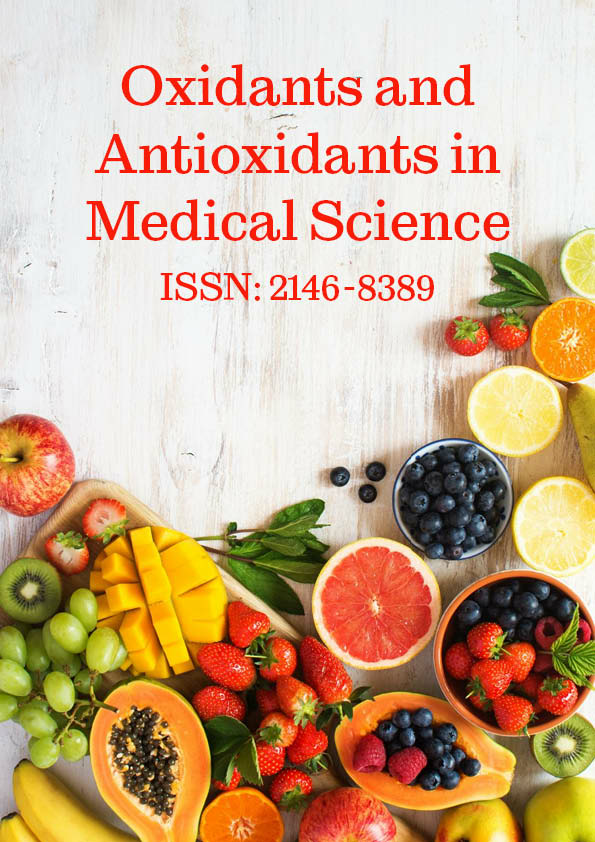Opinion Article - Oxidants and Antioxidants in Medical Science (2023)
The Role of Isoflavones in Hormonal Balance for Women
Parth Roy*Parth Roy, Department of Cancer Biology, Alexandria University, Alexandria, Egypt, Email: ParthRoy@hotmail.com
Received: 13-Nov-2023, Manuscript No. EJMOAMS-23-123452; Editor assigned: 17-Nov-2023, Pre QC No. EJMOAMS-23-123452 (PQ); Reviewed: 01-Dec-2023, QC No. EJMOAMS-23-123452; Revised: 08-Dec-2023, Manuscript No. EJMOAMS-23-123452 (R); Published: 15-Dec-2023
Description
Isoflavones are a class of phytoestrogens, plant-derived compounds that exhibit estrogenic activity. Particularly for women, isoflavones have garnered attention for their potential impact on hormonal balance. The classification of isoflavones into subgroups like genistein, daidzein, and glycitein provides insight into their distinct biological activities. Isoflavones are naturally occurring compounds commonly found in legumes, with soybeans being one of the richest sources. These compounds belong to the phytoestrogen family, structurally resembling estrogen, the primary female sex hormone. The ability of isoflavones to mimic estrogen has led to numerous studies investigating their potential benefits for women’s health.
Hormonal balance in women
Hormonal balance is crucial for women’s overall wellbeing, affecting various aspects of health, including reproductive function, bone density, and cardiovascular health. Estrogen, the main female sex hormone, plays a pivotal role in regulating the menstrual cycle, supporting bone health, and influencing mood. Isoflavones have been associated with favorable effects on cholesterol levels and blood vessel function, potentially reducing the risk of heart disease.
During various stages of life, such as puberty, menstruation, pregnancy, and menopause, hormonal fluctuations are normal. However, imbalances can occur, leading to conditions like Polycystic Ovary Syndrome (PCOS), endometriosis, and hormonal-related cancers. This is where isoflavones come into the spotlight, offering potential support in maintaining hormonal balance.
Isoflavones and estrogen receptor modulation: One key mechanism through which isoflavones exert their effects is by interacting with estrogen receptors in the body. There are two main types of estrogen receptors— ERα and ERβ. Isoflavones have been shown to bind to these receptors, albeit with weaker affinity than natural estrogen. This interaction can have estrogenic or antiestrogenic effects, depending on the existing hormonal milieu.For example, in situations of low estrogen levels, isoflavones may act as weak estrogen agonists, helping to mitigate symptoms associated with hormonal deficiencies. Conversely, in the presence of high estrogen levels, isoflavones may act as estrogen antagonists, potentially reducing the risk of estrogenrelated conditions like breast cancer.
Menopausal symptoms and isoflavones: Isoflavones is their impact on menopausal symptoms. Menopause is a natural biological process marked by the cessation of menstrual periods, typically occurring in a woman’s late 40s or early 50s. During menopause, estrogen levels decline, leading to symptoms like hot flashes, mood swings, and bone density loss.
Isoflavones, with their estrogen-like activity, have been investigated for their potential to alleviate these symptoms. Some studies suggest that isoflavones may help reduce the frequency and severity of hot flashes, improve mood in postmenopausal women. Isoflavones, by exerting estrogen-like effects, may contribute to preserving bone health in postmenopausal women.
Isoflavones in the prevention of hormone-Related cancers: The potential protective effects of isoflavones extend beyond menopausal symptoms. Some studies have explored their role in reducing the risk of hormonerelated cancers, such as breast and endometrial cancers. The estrogenic and antiestrogenic properties of isoflavones may influence cell growth and apoptosis, potentially providing a protective effect against certain cancers.
Isoflavones, found abundantly in soy and other legumes, offer a fascinating avenue for exploring natural ways to support hormonal balance in women. While research is ongoing and findings are not yet definitive, the potential benefits of isoflavones in alleviating menopausal symptoms and reducing the risk of hormone-related cancers are promising. As with any dietary or lifestyle intervention, it’s crucial to consult with healthcare professionals before making significant changes, especially for individuals with pre-existing medical conditions or those taking medications. Isoflavones and their impact on hormonal balance opens the door to a deeper understanding of the intricate interplay between diet, hormones, and women’s health.







